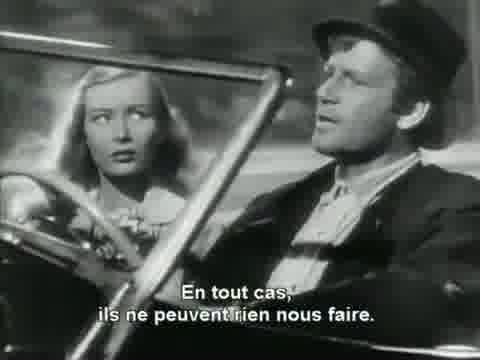Réalisation:
Preston SturgesScénario:
Preston SturgesPhotographie:
John F. SeitzActeurs·trices:
Joel McCrea, Veronica Lake, Robert Warwick, William Demarest, Franklin Pangborn, Porter Hall, Byron Foulger, Robert Greig, Eric Blore, Richard Webb (plus)Résumés(1)
Un réalisateur américain renommé pour ses comédies mais lassé d'Hollywood décide de produire un film dramatique et ancré dans la réalité. (Splendor Films)
Vidéo (1)
Critiques (3)
This tale about a methodical director who decides to live among the regular poor folk to get inspiration for his own film has an interesting variable pace and genre shifts – it starts with a format of almost slapstick sketches, that makes everyone expect a great adventure, followed by a relaxed reflection on Hollywood with the mandatory romantic storyline (as the main character himself says, there must be a woman in every movie), and in the third act it becomes a grave drama that tries to express explicitly the previously implied motifs, with the director experiencing first hand the film he wanted to make. However, not everything fits convincingly together and the sudden break from humour weakens the film, but it remains a clever scheme that leaves room for a classic sweet yet smartly delivered message. On top of that, all the characters are incredibly effective, Joel McCrea is still the cool bloke of The Most Dangerous Game and Veronica Lake is a beautiful and distinctive woman. 80%
()
This idea can seem a bit naive in conclusion, but it is beautiful. Even though one experiences enough difficulties, why not redeem it with something good? Why not make others happy purely for the sake of their joy? Spreading joy is beautiful, even if it may not be as artistic or profit as much money. Great actors in lead roles, Veronica Lake is absolutely stunning, and on top of that, such a combination of comedy and drama that some filmmakers today can only envy. This is why I adore old movies - they say what movies say today, they just did it much earlier and often in an unbelievable way.
()
“With a little sex in it.” The forth of Preston Sturges’s eight comedies released in rapid succession, Sullivan’s Travels doesn’t conceal the fact that its maker was one of the first screenwriters in Hollywood to work his way up to the position of director. Sullivan’s Travels is engaging with the sardonic perspective of an insider who definitely does not hold the machinery of Hollywood in such high regard as his colleagues without a screenwriting background. Sturges’s dedication to the word comes shining through in the opening seven-minute scene, a long exposition through dialogue that, in addition to introducing the protagonist, also poses the film’s key question, which touches on the essence of fictional worlds as such. What is film for? In order to find the answer, Sully has to step outside of the illusion that he is living and undertake a Gulliver-esque journey into another world. Though his interaction with reality starts out as slapstick, it gradually takes on the features of social drama. In order to understand that poverty is not to be exploited, but lived, Sully has to become an actor in the story that he wanted to tell. However, the change of the narrative’s tone is too pronounced and the film ceases to be a satire as it loses its humour and comedic flair. We could easily describe it as inconsistent and generally poorly made. Nevertheless, the ability to comment on its own development as demonstrated by the screenplay (“there’s always a girl in the picture”) discourages us from making such a clear-cut judgment. In my opinion, the unsettling change of style was Sturges’s way of supporting the point of the film, which at the same time is a defence of the artistic path that he chose for himself. Everyone should use their talent for what suits them best. In Sturges’s case, that was clever comedies combining Chaplin’s humanism (which indirectly seeped into the film thanks to the motif of vagrancy and the use of silent-film aesthetics) and Lubitsch’s razor-sharp studies of manners. 75%
()



Annonces